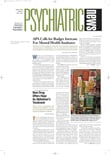The early-career period is often a very challenging time in the life of a psychiatrist. In addition to getting established in a new job, paying back loans, and adjusting to the weight of new levels of responsibility, there are the stresses of the ever-looming board exam.
As it turned out, I was one of the many whose board exam results come back with a “negative determination.” Failing Part II of the boards affected me in a profound way. As I struggled for several months to re-establish my equilibrium and put the experience into context, I took inventory of the process.
Other than the “Boarding Time” guide to the ABPN exam, I could find little information about the psychiatry boards, including how to prepare for and conduct myself during the patient exam part of the boards.
Part I seemed straightforward enough. If one were to fail, it was probably due to either inadequate textbook study or test-taking anxiety.
Part II, in contrast, is completely different. You are being judged by your peers and more-senior colleagues, which is arguably a more subjective process than a written test. You know nothing about the patient you are expected to interview. You get no immediate feedback from the examiners. You travel hundreds of miles, dressed in clothes you would sooner wear to a wedding than to work. You are asked to interview a stranger in front of other strangers in a strange city. The whole experience was foreign to me, and I found myself ill prepared.
Even after passing Part II, however, I was left with mixed feelings. While relieved, I still felt frustrated by the process. Much of the information I gathered about how best to prepare for Part II came from friends’ “war stories” about what worked or did not work for them. Beyond those stories, it took a tremendous amount of detective work, self-analysis, and repetitive practice to find the balanced approach needed to pass.
Having had this much trouble preparing, I concluded that there must be many others in the same situation who could use some help. Out of this frustration, I decided to act.
One night in March last year, I began looking up domain names on the Internet. Somewhat impulsively, I decided to register the name “Psychboards.org” and set up a server account, not knowing exactly what I would do with it. Over the following few days, I began to brainstorm. I tried to remember what information I had wanted when preparing for the boards a few years earlier, and that became the genesis of the Web site.
The first page to be developed provided basic information about test dates, with added links to the corresponding hotels and cities. Next came the message board and a resource list to help guide those preparing for the test. Some entertaining items were also added, such as psychiatric hangman and the “psychobabble generator.”
I designed the site’s structure to be interactive, with the goal of developing a community where people could come to exchange information and find support.
Since March 2002, the Web site, www.psychboards.org, has experienced steady growth, with more than 7,000 visitors as of mid-April. A number of people have offered some useful suggestions that may be included in future revisions. So far, this has been an exciting endeavor, which I believe will grow in quality and usefulness as more people visit and participate. ▪

